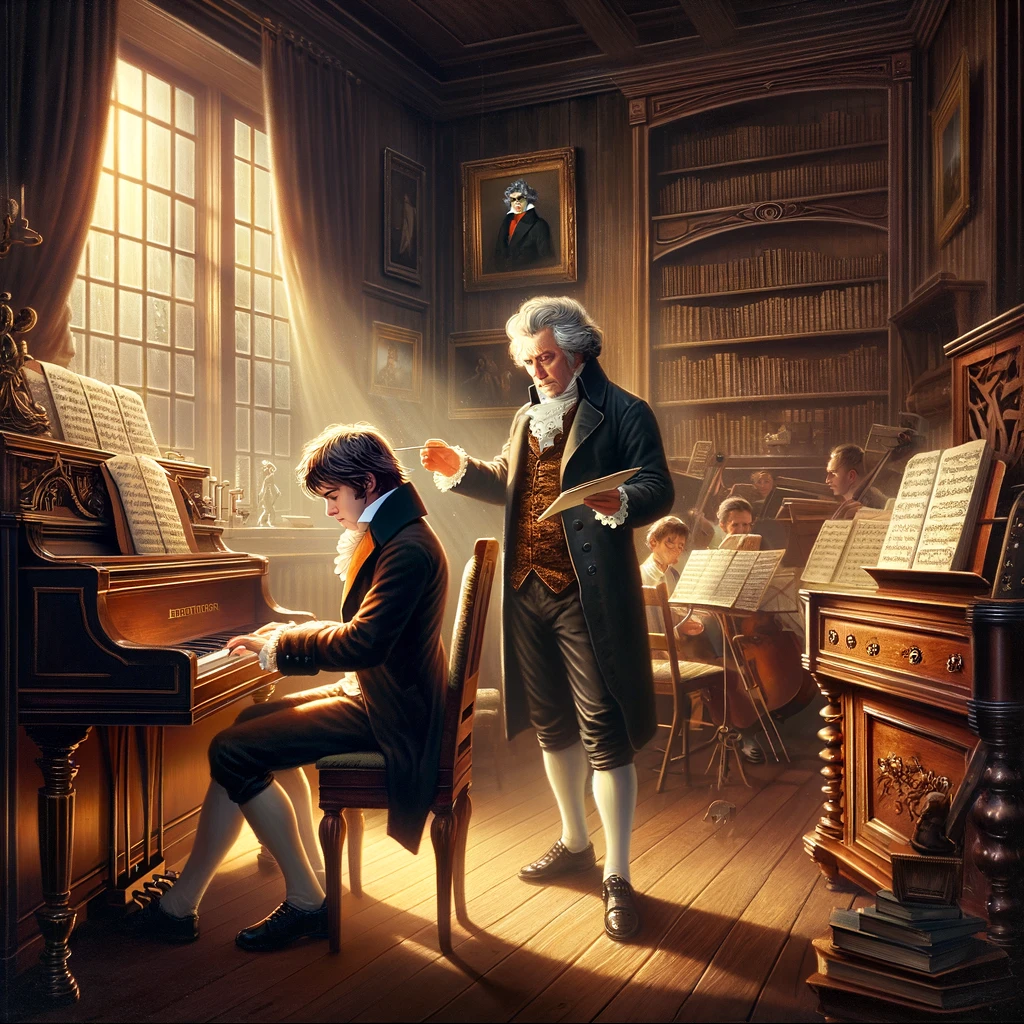
Beethoven’s Teachers: Key Influences in His Early Career
Ludwig van Beethoven, a name synonymous with musical genius, had a journey like no other. His early life and career were pivotal in shaping the maestro we revere today. It’s a tale of talent, resilience, and, importantly, influential teachers who molded his raw abilities into something extraordinary.
Humble Beginnings
Born in Bonn in December 1770, Beethoven’s musical story began in a less-than-ideal setting. His father, Johann van Beethoven, a singer in the Electoral court, recognized his son’s potential early on. However, Johann’s harsh teaching methods and struggles with alcoholism often overshadowed the nurturing a young Beethoven needed.
Johann van Beethoven: The First Mentor
Despite his shortcomings, Johann was Beethoven’s first music teacher. He introduced Ludwig to the basics of music, instilling a foundation that would later be built upon by more accomplished mentors. Johann’s approach, while strict, set Ludwig on a path to musical exploration.
Christian Gottlob Neefe: The Enlightener
When Beethoven was just ten, he began studying under Christian Gottlob Neefe, a composer and court organist in Bonn. Neefe’s influence on young Beethoven was profound. He introduced him to the works of Bach and Mozart, broadening his musical horizon. Under Neefe’s guidance, Beethoven published his first composition, a set of nine piano variations, by the age of twelve.
Neefe not only taught Beethoven the complexities of composition but also recognized his extraordinary talent. He predicted that Beethoven would “surely become a second Wolfgang Amadeus Mozart if he continues as he has begun.”
The Mozart Connection
Speaking of Mozart, it’s often speculated whether Beethoven received any direct tutelage from the prodigious composer. In 1787, a young Beethoven traveled to Vienna, hoping to study under Mozart. The details of their interaction remain a matter of historical debate, but this journey undoubtedly exposed Beethoven to a broader musical landscape.
Franz Joseph Haydn: The Classical Influence
In 1792, Beethoven began a new chapter in Vienna under the tutelage of Franz Joseph Haydn, a leading figure of the Classical era. This period was crucial; Haydn’s influence brought a new level of sophistication to Beethoven’s compositions. Their relationship, however, was complex. While Haydn recognized Beethoven’s talent, there were occasional clashes, possibly due to differing personalities and creative approaches.
Beyond Haydn
While Haydn was a significant influence, Beethoven sought lessons from other musicians in Vienna. Johann Georg Albrechtsberger, famous for his counterpoint skills, and Antonio Salieri, known for his operatic expertise, also contributed to Beethoven’s education. This period was marked by intense study and the honing of his skills, laying the groundwork for his future masterpieces.
The Revolutionary Artist Emerges
Under these myriad influences, Beethoven’s style began to evolve from the Classical traditions. He started infusing his compositions with a unique expressiveness and dramatic flair, signaling the dawn of the Romantic era in music.
As Beethoven’s hearing began to deteriorate, his music became more profound and introspective, yet it retained a revolutionary edge. His teachers had laid the foundation, but it was Beethoven’s own genius and resilience that ultimately shaped his musical journey.

The Impact of Beethoven’s Teachers
The lessons Beethoven learned from his array of teachers were more than just technical. They were lessons in creativity, expression, and the courage to innovate.
Learning the Language of Emotion
Neefe and Haydn, in particular, helped Beethoven understand that music was not just about notes and rhythm; it was about conveying emotion. Under their guidance, he learned to translate feelings into melodies, a skill that would become a hallmark of his compositions.
The Challenge of Individuality
Despite the profound knowledge imparted by his teachers, Beethoven often found himself at odds with their teachings. He was a rebel at heart, always pushing boundaries and challenging conventions. This friction between traditional teachings and his innate desire for innovation was crucial in developing his unique style.
The Path to Independence
By the late 1790s, Beethoven began to move away from his mentors’ influence, forging his own path. His early compositions, like the Pathétique Sonata (1798), reflected a bold departure from the norms of the time. This period marked the beginning of what is often called his “Heroic” phase, characterized by powerful, expressive music that resonated with the spirit of the time.
The Influence of the Enlightenment
The philosophical ideals of the Enlightenment greatly influenced Beethoven. Inspired by ideas of freedom and individuality, his music began to take on a new character – one that spoke to the human experience and the struggle for liberty. This was music with a purpose, music that transcended mere entertainment.
Beethoven’s Evolution and His Teachers’ Legacy
In the end, Beethoven’s relationship with his teachers was a complex tapestry of instruction, influence, and, ultimately, departure. He respected the foundations they provided but was unafraid to transcend them.
A Legacy Beyond Instruction
What Beethoven’s teachers truly provided was not just knowledge of music, but the inspiration to challenge and reinvent it. They sparked a flame that would turn into a blazing fire of creativity and innovation in Beethoven’s hands.
Beethoven’s Contribution to Music
As Beethoven’s career progressed, his music grew in depth and complexity, mirroring the challenges he faced in his personal life, including his tragic deafness. His late works, such as the Ninth Symphony, are a testament to his mastery and the culmination of a life’s journey in music, influenced but not confined by his early teachers.
Conclusion: A Journey Shaped by Many
Beethoven’s journey was marked by the influence of several key figures, but it was his own indomitable spirit that truly defined his path. His teachers laid the groundwork, but it was Beethoven who built the castle. He took their lessons, their wisdom, and their musical legacies and used them to forge a new musical language that continues to inspire and move people around the world. In understanding Beethoven’s early life and career, we see not just a story of a student and his teachers, but the story of music’s evolution through one of its greatest pioneers.